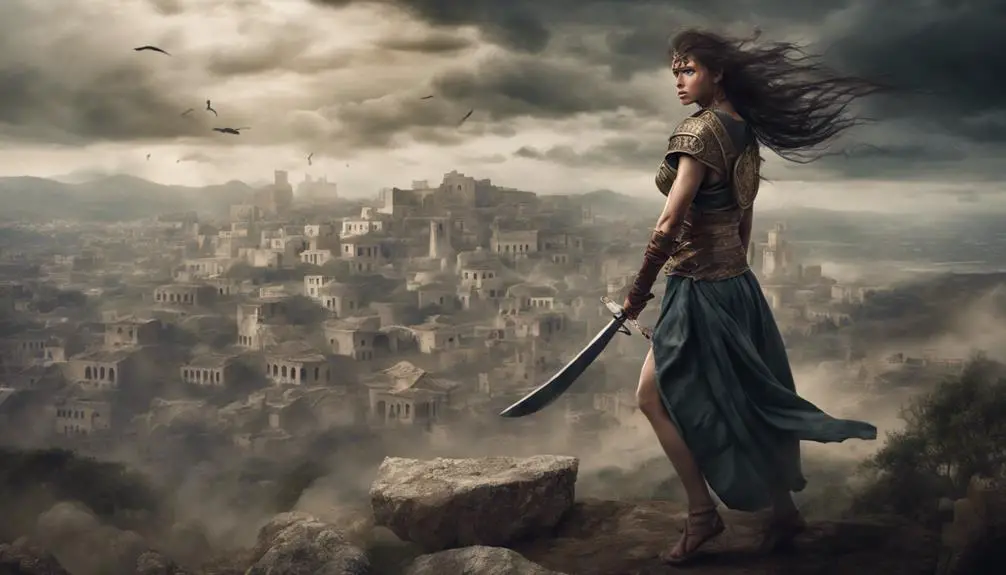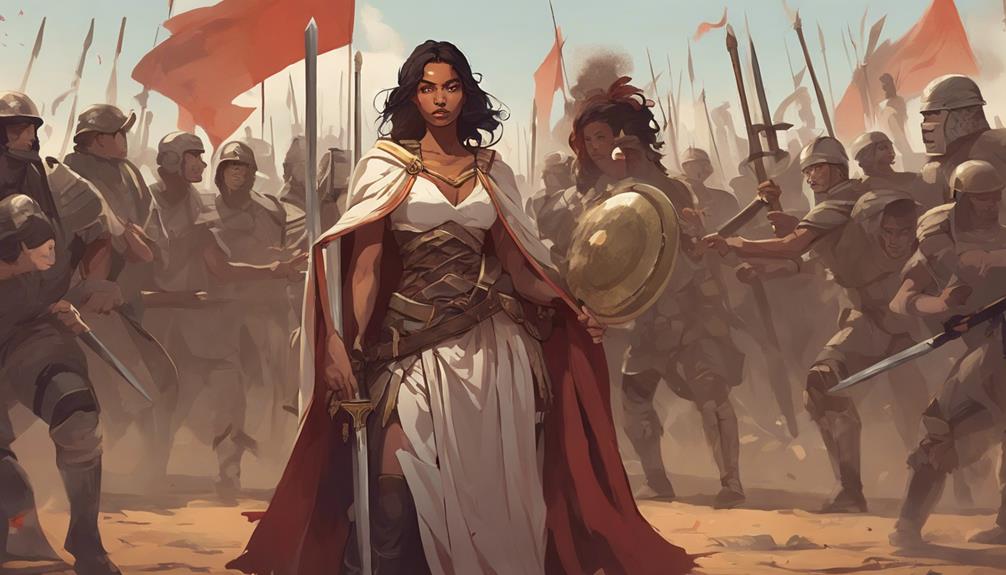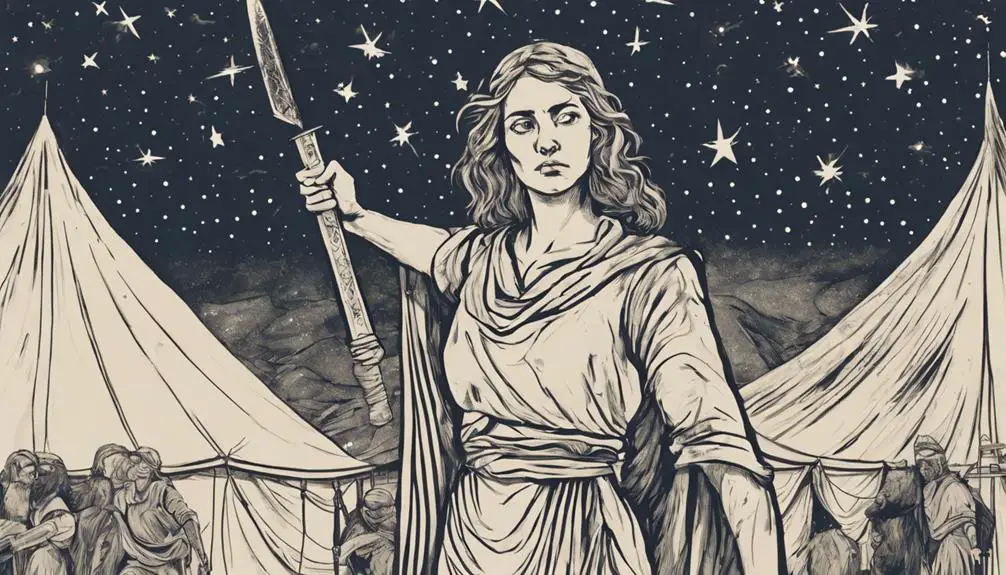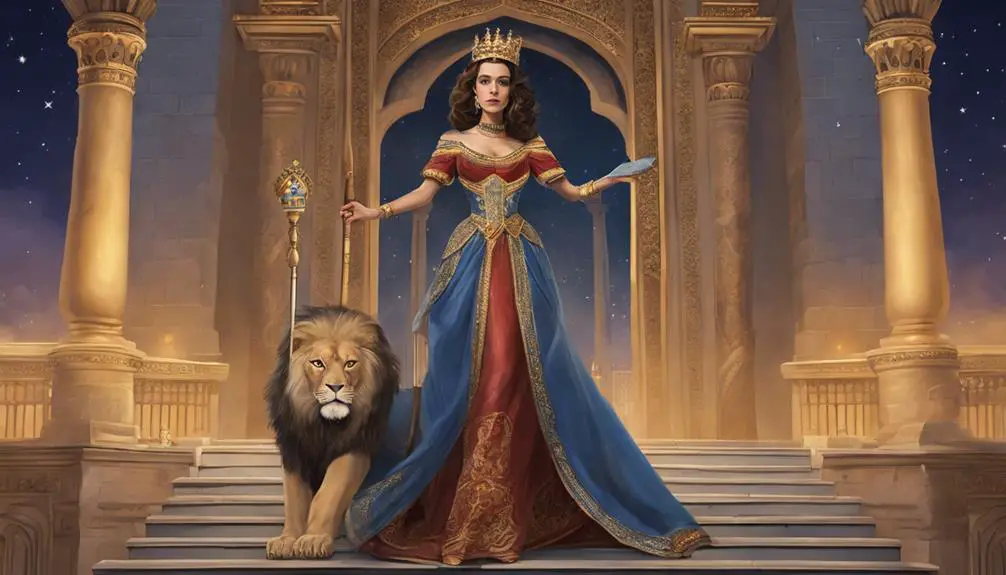Meet the fearless female warriors of the Bible, whose stories of courage and faith continue to inspire and challenge us today.

Warrior Women in the Bible
While some might argue that the Bible predominantly features men in roles of strength and leadership, you'll find that it also celebrates warrior women who've made indelible marks on history. From Deborah, who served as both a judge and a general, to Jael, the tent peg heroine, these stories aren't just about physical strength but also about courage, wisdom, and faith.
As you explore the lives of Judith, the headstrong widow, Esther, the brave queen, and Jephthah's daughter, the sacrificial hero, you'll uncover a rich tapestry of female empowerment that's as relevant today as it was thousands of years ago. What might these ancient narratives teach us about leadership, bravery, and sacrifice in our current era?
Key Takeaways
- Biblical narratives feature women like Deborah and Jael who defy traditional gender roles through acts of valor and strategic warfare.
- Judith and Esther demonstrate that faith and ingenuity can empower women to overcome formidable enemies and save their people.
- The stories of these women are not just about physical strength but also about moral and spiritual fortitude.
- Jephthah's Daughter's story highlights the complexities of sacrifice, showing that heroism can also be found in obedience and personal loss.
Deborah: The Judge and General

Deborah stands out as a pivotal figure in biblical history, embodying both the roles of a judge and a military leader with remarkable prowess. Her story, deeply embedded in the fabric of theological discourse, presents a unique blend of prophetic leadership and astute military strategy, setting her apart from her contemporaries.
As a prophetess, Deborah's authority was divinely sanctioned, allowing her to guide Israel with spiritual and moral clarity. Her leadership style, characterized by wisdom and decisiveness, enabled her to mobilize the Israelites against their Canaanite oppressors, showcasing an exceptional understanding of warfare dynamics.
Her role in planning and executing the battle against the forces of King Jabin of Canaan underscores her strategic acumen. By summoning Barak to lead the army, she displayed a keen sense of delegation and tactical planning, ensuring that the military endeavor was underpinned by both divine favor and strategic foresight.
Through her, one observes a confluence of spiritual guidance and military preparedness, illustrating how prophetic insight can coalesce with tactical expertise to achieve victory. Deborah's legacy, thus, extends beyond her military achievements, highlighting the potency of combining prophetic leadership with comprehensive military strategy in navigating the complexities of governance and warfare.
Jael: The Tent Peg Heroine

Among the tales of valor in the Bible, Jael's decisive act of driving a tent peg through the skull of Sisera, an oppressing general, stands as a testament to the unexpected ways in which women have shaped biblical narratives through acts of courage and strategic intervention. This story not only highlights Jael's bravery but also delves deep into the symbolism of the tent peg and its implications. Traditionally, tent pegs represent the securing of one's home and, by extension, one's nation. Jael's use of a domestic tool to achieve a military victory underscores the theme of unexpected heroines who operate outside the traditional boundaries of warfare and gender roles.
Jael's story challenges the reader to reconsider the role of women in ancient texts and societies. It showcases how women, often underestimated, can wield significant power in decisive moments. The tent peg, a symbol of domesticity, transforms into a symbol of strength and deliverance, further emphasizing the narrative's subversion of expectations. Jael emerges not just as a defender of her people but as an emblematic figure of unexpected heroines, who, through their actions, redefine the parameters of courage and strategy.
Judith: The Headstrong Widow

In the narrative of Judith, a widow's daring beheading of Holofernes, an Assyrian general, showcases another remarkable instance of a woman taking a pivotal role in Biblical history through strategic courage and an unwavering resolve. This act not only halted the Assyrian confrontation but also elevated Judith as a symbol of indomitable widow's courage facing overwhelming odds.
Here are three key aspects to consider:
- Strategic Ingenuity: Judith's approach to infiltrating the enemy camp under the guise of defection demonstrates her remarkable strategic thinking. Her ability to deceive Holofernes, leveraging her beauty and wit, underscores a calculated risk taken in dire circumstances.
- Spiritual Conviction: Her actions were deeply rooted in her faith, believing her mission to protect her people was divinely inspired. This conviction provided her the moral fortitude to carry out such a perilous act.
- Legacy of Empowerment: Judith's story transcends time, inspiring countless generations. It challenges societal norms about women's roles and capabilities, especially in leadership and combat situations.
In analyzing Judith's story, you're prompted to appreciate the complexities of her motivations, the depth of her courage, and the lasting impact of her actions in the context of Biblical narratives and beyond.
Esther: The Brave Queen

Esther's story exemplifies the courage and astuteness required to navigate the perilous waters of royal politics, illustrating her pivotal role in saving her people from genocide. Her journey from a humble beginning to becoming the queen of Persia showcases not only royal courage but also political wisdom, virtues that were critical in her era. You'll find that Esther's bravery wasn't just in her willingness to approach the king unsummoned—a move that could have led to her death—but in her strategic planning and timing.
Her political wisdom shines through her method of revealing Haman's plot to the king, choosing to do so during banquets she organized, rather than in a direct accusation. This subtlety in approach ensured the king's receptiveness and ultimately led to the salvation of her people. Esther's narrative teaches you the importance of understanding the power dynamics at play and using them to your advantage.
In essence, Esther's story is a masterclass in leveraging one's position and wisdom for the greater good. Her legacy is a testament to the fact that royal courage and political wisdom can indeed change the course of history, making her a true warrior woman of the Bible.
Jephthah's Daughter: The Sacrificial Hero

Shifting focus to another remarkable figure, we encounter Jephthah's daughter, whose narrative unveils a profound tale of sacrifice and devotion within the biblical pantheon of warrior women. Her story, deeply embedded within the complex tapestry of the Old Testament, presents a moving account of unwavering loyalty and the tragic dimensions of vow consequences.
Consider the following aspects to understand her unique position:
- Vow Consequences: Jephthah, her father, makes a rash vow to God, promising to sacrifice the first thing that greets him upon his victorious return. This vow's dire consequence falls upon his unsuspecting daughter, illustrating the weight and recklessness of vows made without foresight.
- Daughter's Obedience: Despite facing a grim fate, Jephthah's daughter embodies a rare form of bravery. Her willingness to accept her father's vow showcases her as a figure of immense faith and obedience, traits that elevate her narrative beyond a mere victim of circumstances.
- Sacrificial Heroism: Her story transcends the personal tragedy to reflect on broader themes of sacrifice, duty, and the complex interplay between personal vows and their unintended impacts on others. Her acceptance of her fate, coupled with her request for a brief period to mourn her impending loss, paints her as a hero in her own right.
Frequently Asked Questions
How Have Interpretations of These Warrior Women's Stories Evolved in Modern Feminist Theological Discourse?
In modern feminist theological discourse, interpretations of these narratives have significantly evolved. Through theological reinterpretation and feminist exegesis, scholars are uncovering layers of meaning previously overlooked.
You're seeing a shift towards recognizing the agency, leadership, and complexity of these figures, challenging traditional perceptions. This analysis not only enriches our understanding of the texts but also empowers contemporary discussions on gender and spirituality.
In What Ways Have These Biblical Figures Been Represented in Arts and Literature Outside of Religious Texts, and How Do These Portrayals Compare to Their Biblical Descriptions?
You're exploring how figures have been depicted in arts and literature beyond their original narratives, focusing on the balance between artistic license and cultural adaptation. This analysis highlights the ways these portrayals stretch or adhere to their foundational stories.
How Do the Stories of These Women Intersect With the Contemporary Understanding of Gender Roles and Leadership in Various Religious Communities?
When you explore how stories intersect with modern perceptions of gender dynamics and leadership styles, it's crucial to analyze the shift in societal norms. These narratives challenge traditional roles, showcasing women in positions of power and decision-making.
They prompt a reevaluation of leadership within communities, particularly religious ones, urging a comparison between historical depictions and contemporary expectations. This analysis reveals an evolving understanding of gender roles and the complexity of leadership across cultures.
What Are the Archaeological or Historical Evidences (If Any) That Support the Existence or the Deeds of These Warrior Women as Described in the Bible?
You're diving into whether there's concrete evidence supporting historical figures' existence and their actions.
Artifact verification plays a crucial role here, as it can confirm or debunk claims made in ancient texts. Similarly, analyzing military strategies mentioned can offer insights into the reality of these accounts.
While direct evidence might be scarce, a scholarly, analytical approach helps contextualize what's known and what remains speculative about these fascinating individuals.
How Have the Stories of These Women Been Utilized or Referenced in Modern Social and Political Movements, Particularly Those Related to Women's Rights and Empowerment?
You've seen how stories can influence modern movements, particularly in women's rights and empowerment. The tales you're curious about have been pivotal, serving both as media representation and political symbolism. They've empowered activists and leaders by providing historical precedents of strength and leadership.
These narratives have been analyzed, referenced, and utilized to inspire and justify efforts for gender equality, playing significant roles in shaping contemporary views on female capabilities and rights.
Conclusion
In analyzing the narratives of warrior women in the Bible, it's clear they're not merely ancillary characters but pivotal figures shaping Israel's history. Deborah's leadership, Jael's courage, Judith's cunning, Esther's bravery, and the tragic valor of Jephthah's daughter illuminate a pattern: women stepping into roles of power and decision-making during critical moments.
Their stories challenge traditional gender roles, suggesting a complex interplay between divine providence and human agency in the biblical text's portrayal of female strength and resilience.



Sign up